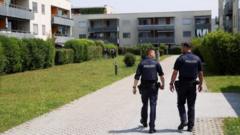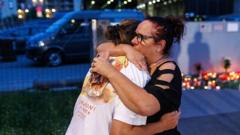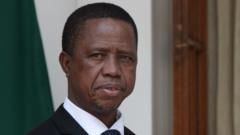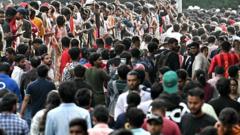As millions gather to pay their respects, the environment showcases a mixture of sadness and appreciation for a leader who was deeply rooted in compassion and social justice.
**Rome in Reflection: Mourning and Memory Following the Pope's Death**

**Rome in Reflection: Mourning and Memory Following the Pope's Death**
Rome experiences a unique atmosphere of reverence and contemplation as it mourns Pope Francis, yet embraces the future with hope and reflection.
In the days following the death of Pope Francis at the age of 88, the atmosphere in Rome has shifted to one of deep reflection and somber celebration. St. Peter's Square, often bustling with tourists, now reverberates with the hymns of grey-clad nuns singing Ave Maria. This poignant scene unfolds alongside lengthy queues formed by thousands eager to pay their last respects. Locals and visitors alike describe a distinct change in the air—an unusual calm amidst the crowds, bringing forth a chance for personal introspection.
Elena, a resident of Rome originally from Romania, shares her observations of this "pensive" mood enveloping the city. She notes that even individuals who may not closely follow religious practices feel the impact of Francis's passing, leading to significant moments of contemplation. Her friend Lina echoes this sentiment, suggesting the current week serves as an opportunity for reflection, rather than outright celebration or grief.
Amidst the silence, the details surrounding the Pope's funeral garner attention. The procession to Santa Maria Maggiore church will be a slow journey of approximately four kilometers, allowing the public to say farewell as the Pope's coffin passes. This deliberate pace seems to resonate with the locals; it's a testament to the respect they hold for this transformative leader.
Security measures are visibly heightened in the city, preparing for the forthcoming funeral. Soldiers equipped with specialized devices scan the skies, while officers mingle effortless among the crowds, providing a sense of safety during these days of collective mourning. Yet, attendees like American student Caislyn express a comforting sense of security, viewing the atmosphere as "bittersweet" — a celebration of Francis's life and his profound impact on the world.
Memories of the Pope's commitment to the marginalized often echo among those in attendance. Many fondly reminisce about his last public appearance—visiting prisoners on Maundy Thursday—highlighting that his advocacy for the less fortunate defined his papacy. Elena reflects on the Pope's humility throughout his journey, noting how his own background of poverty in Argentina kept him grounded.
Tourists, like Belgian traveler Dirk, acknowledge the notable juxtaposition of affluence surrounding religious institutions and the visible poverty within the city. The contrast remains jarring, and raises questions about the roles these churches play within the community they serve.
As pilgrims of all backgrounds gather, sharing a profound collective experience, the atmosphere of remembrance lingers. Those who received blessings from Pope Francis before his departure, such as Katleho from Lesotho, express feelings of joy and privilege in being part of history. Opposed to a week marked solely by grief, the current days remind many of the values Francis espoused: compassion, humility, and the importance of community.
The collective spirit and emotional presence felt during this time serves as a poignant reminder of the bond forged by shared experiences, transcending borders and beliefs. Rome stands transformed, not just as the hub of Catholicism, but as a stage for the world to reflect on the legacy of a Pope who embodied the essence of love and kindness in a time of complexity and strife.
Elena, a resident of Rome originally from Romania, shares her observations of this "pensive" mood enveloping the city. She notes that even individuals who may not closely follow religious practices feel the impact of Francis's passing, leading to significant moments of contemplation. Her friend Lina echoes this sentiment, suggesting the current week serves as an opportunity for reflection, rather than outright celebration or grief.
Amidst the silence, the details surrounding the Pope's funeral garner attention. The procession to Santa Maria Maggiore church will be a slow journey of approximately four kilometers, allowing the public to say farewell as the Pope's coffin passes. This deliberate pace seems to resonate with the locals; it's a testament to the respect they hold for this transformative leader.
Security measures are visibly heightened in the city, preparing for the forthcoming funeral. Soldiers equipped with specialized devices scan the skies, while officers mingle effortless among the crowds, providing a sense of safety during these days of collective mourning. Yet, attendees like American student Caislyn express a comforting sense of security, viewing the atmosphere as "bittersweet" — a celebration of Francis's life and his profound impact on the world.
Memories of the Pope's commitment to the marginalized often echo among those in attendance. Many fondly reminisce about his last public appearance—visiting prisoners on Maundy Thursday—highlighting that his advocacy for the less fortunate defined his papacy. Elena reflects on the Pope's humility throughout his journey, noting how his own background of poverty in Argentina kept him grounded.
Tourists, like Belgian traveler Dirk, acknowledge the notable juxtaposition of affluence surrounding religious institutions and the visible poverty within the city. The contrast remains jarring, and raises questions about the roles these churches play within the community they serve.
As pilgrims of all backgrounds gather, sharing a profound collective experience, the atmosphere of remembrance lingers. Those who received blessings from Pope Francis before his departure, such as Katleho from Lesotho, express feelings of joy and privilege in being part of history. Opposed to a week marked solely by grief, the current days remind many of the values Francis espoused: compassion, humility, and the importance of community.
The collective spirit and emotional presence felt during this time serves as a poignant reminder of the bond forged by shared experiences, transcending borders and beliefs. Rome stands transformed, not just as the hub of Catholicism, but as a stage for the world to reflect on the legacy of a Pope who embodied the essence of love and kindness in a time of complexity and strife.






















